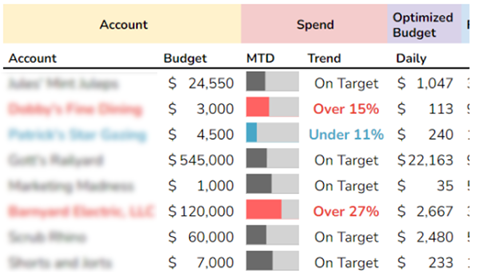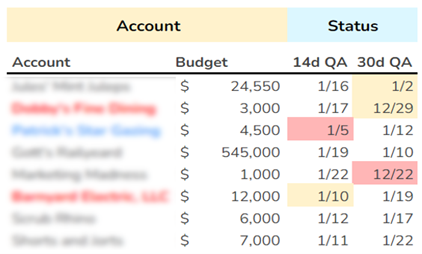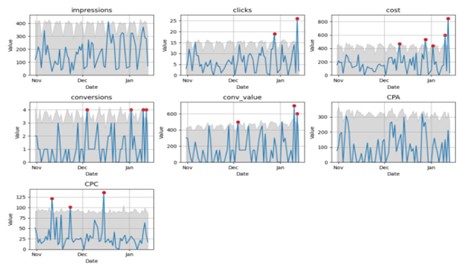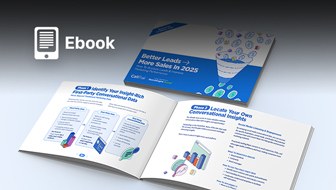This post was sponsored by Redesign.co. The opinions expressed in this article are the sponsor’s own.
Tired of overspending on PPC tools that provide more than you need? It’s time to get back to the basics.
In This Guide
- 1. Become Proficient In Google Ads Offline Editor: Your Secret Weapon For Quick Edits
- 2. Master DIY Tools: Easily Build Quick Solutions In Your PPC Workflow
- 3. Streamline Account QA & Maintenance: Google Sheets As Your Efficiency Ally
- 4. Use Google Apps Script For Proactive Automation
- 5. Bonus Tip For The Tech-Savvy: Advanced Automation With Anomaly Detection
- 6. Transform Your PPC The Redesign.co Way
Whether you’re an established PPC manager or a small business owner handling your company’s Google Ads campaign, advertising tasks can quickly become overwhelming.
While it’s tempting to turn to pre-packaged software for help, there may be a more efficient way.
Learn to do more with less by following a few PPC management tips for maximum efficiency and performance.
1. Become Proficient In Google Ads Offline Editor: Your Secret Weapon For Quick Edits
Time Savings: 1 hour/week
It’s surprising how many Google Ads users neglect this powerful tool.
With the Google Ads Offline Editor, you can quickly download, edit, copy, paste, move, review, and upload changes.
The real magic is that you can make dozens of changes in seconds without waiting for the browser to reload every time you go to another screen. If you’ve spent any time in the Online Editor, you know how annoying this can be.
How Google Ads Offline Editor Speeds Up Your PPC Workflow
Here’s a quick example of how efficient the Offline Editor can be.
Imagine you’re running a PPC ads campaign called “Plumbing.”
You’ve got various services under this umbrella, but you’ve noticed that water heaters are particularly in demand.
So, you decide it’s time to break out the “Water Heaters” ad group from your Plumbing campaign into its own campaign.
In 15 seconds, working offline in Google Ads Editor, you can:
- Duplicate the “Plumbing” campaign.
- Rename it “Water Heaters”.
- Delete the non-relevant ad groups in the new campaign.
- Pause the old Water Heater ad group in the old campaign.
If you do this online, each action – pausing or deleting – requires navigating through and waiting for multiple web pages to load.
Offline, making changes like pausing multiple ad groups or deleting irrelevant keywords can be done in bulk with a few clicks, without any loading delays.
While seemingly insignificant, small delays add up to significant amounts of wasted time and decreased productivity throughout a campaign’s lifespan.
This streamlined approach not only saves time but also eliminates the clutter of “paused” or “removed” assets in your campaign, keeping your workspace organized and focused.
In the Offline Editor, you can make edits before posting online. When you delete items from the new campaign, there’s no history of the old keywords, ads, or ad groups existing. Once they’re gone, they’re gone – no residual clutter.
But this just scratches the surface regarding the Offline Editor’s functionality. Here are a few other things you can do with this no-cost tool:
- Upload/edit campaigns in bulk from a CSV.
- Import from Google Drive.
- Quickly apply Negative Mobile App lists (among many other options).
- Copy and paste location targeting in seconds.
- Compare account structures side-by-side.
- Edit PMAX campaigns.
- Upload photos.
- Edit extensions in bulk.
- Catch errors before pushing live.
2. Master DIY Tools: Easily Build Quick Solutions In Your PPC Workflow
Time Savings: 20 min/week
Need Custom, No-Cost PPC Tools? Build Yours With Our Help.
Are you considering using high-end budget pacing tools? You may be surprised to find that creating your own versions in spreadsheets can be more effective.
Despite popular opinion, automated PPC management software does not guarantee a life free of issues. In fact, it gives some people a false sense of security.
Does this mean that you should completely shy away from automation? Absolutely not!
While automation is useful, it shouldn’t entirely replace vigilant, hands-on management.
For instance, what if data to the software lags or something is set up incorrectly and the software starts ramping budget unbeknownst to you?
In fact, we’ve seen an account overspend by nearly 50% in a month under automated software.
How To Track PPC Campaigns At A Lower Cost
Imagine starting your day by reviewing a custom spreadsheet in Google Sheets or Excel that acts as your PPC command center.
A custom spreadsheet can:
- Show yesterday’s spend, monthly pacing versus budget, and L7 and L30 KPIs.
- Offer complete recommendations for daily budget adjustments.
- Actively recommend actions to meet your monthly targets.
- Display alerts to flag any account that starts overspending.
- Keep your PPC team agile and informed.
With our spreadsheets, we manually make budget changes at Redesign.co because, frankly, we want that control.
Budgets are vital to client-agency relationships, and keeping the decision-making power close at hand ensures every dollar spent is a dollar well-considered.
Another significant advantage you’ll find with Google Sheets or Excel is the ability to tailor reports to your specific needs – a level of flexibility often lacking in PPC management software.
We’ve used the same report for over a year, and it’s custom-built for us. It’s still 98% the same as one year ago.
Talk about a huge ROI on our initial time spent building it!
-
 Image created by Redesign.co, January 2024
Image created by Redesign.co, January 2024
3. Streamline Account QA & Maintenance: Google Sheets As Your Efficiency Ally
Time Savings: 2 hours/week
Simplify Your PPC QA. Let Us Help Create Your Free Template.
Google Sheets can also play a critical role in your PPC management by creating robust systems and processes for PPC account QA and maintenance.
Mistakes like burning through a month’s budget in two days, directing traffic to the wrong website, or typos in ad copy are costly.
It’s the little things that often go unnoticed until they snowball into major issues, affecting your credibility and client trust.
Use a simple tool like Sheets or Excel to create well-crafted, structured systems to prevent mistakes.
We use systems and QA checklists to:
- Keep PPC budgets on track.
- Ensure traffic goes to the correct landing page.
- Regularly review search terms.
- Catch ad copy typos.
- Monitor ad schedules and targeting accuracy.
- Quickly fix conversion tracking issues.
- Stay on top of crucial account verification deadlines.
- Notice subtle changes in performance.
With thorough, well-designed QA lists in a spreadsheet, you can zip through your weekly and monthly QA checks, sidestepping blunders that cost time and money and hurt client relationships.
We’ve learned that even the sharpest managers benefit from structured systems. Allowing managers to “wing it” and rely solely on their expertise creates blind spots.
Mistakes happen not because people are unqualified but because they’re human; structure and systems act as a guardrail against costly human mistakes.
Avoiding a common yet critical PPC mistake requires a delicate balance: not getting too absorbed in the minutiae or losing sight of the big picture when optimizing accounts.
The key is in setting up systems that allow managers to effectively alternate between a “10,000-foot view” for overarching strategy and a “magnifying glass” for detailed scrutiny.
How To Set Up QA In Google Sheets
The Easy Way: Build Your Free Custom Template With Us.
Utilizing Google Sheets or Excel for listing all essential tasks scheduled bi-weekly and monthly and holding our team accountable for each task.
A built-in notification feature gently nudges us if a task is overdue, ensuring that nothing slips through the cracks.
-
 Image created by Redesign.co, January 2024
Image created by Redesign.co, January 2024
-
 Image created by Redesign.co, January 2024
Image created by Redesign.co, January 2024
4. Use Google Apps Script For Proactive Automation
Time Savings: 1 hour/week
Losing sleep at night worrying about your Google Ads campaigns? The key to your peace of mind is preventing problems before they happen.
By using Apps Script to automate certain tasks, you can keep all your campaigns on track, even when you’re focused elsewhere.
Scripts require a bit of coding knowledge, but the proliferation of ChatGPT allows you to get 90% of the code written for you.
One of our favorite scripts at the moment pauses campaign ad spend and sends an email when an account reaches a pre-set threshold. The applications don’t stop at monitoring ad spend, though.
Need help catching PPC errors?
From scanning PPC ad copy for spelling mistakes and broken URLs to setting up alerts for sudden changes in KPIs, Google Apps Script can be your first line of defense.
Looking to refine PPC keyword strategies?
Set up a script to analyze search terms and send a monthly summary of those generating clicks but not conversions.
Tired of pulling data for reports?
Use a script to automate the process in a Google Sheet for real-time reporting and analysis.
You can even connect it to the reporting dashboard mentioned earlier so that it’s entirely hands-off once built!
Bonus Tip For The Tech-Savvy: Advanced Automation With Anomaly Detection
Time Savings: 2 hours/week
If you’re already comfortable with Apps Script and have experience with Python or R, you can take the previous strategy up a notch by automating anomaly detection.
This isn’t a beginner strategy, but we’ve found it incredibly effective. By combining the vigilance of Google Scripts with the analytical power of Python, we’ve set up a system at Redesign.co that alerts us to any unusual activity within our campaigns.
Every morning, we receive a report pinpointing recent anomalies, complete with graphs of key metrics to help us grasp the full context.
-
 Image created by Redesign.co, January 2024
Image created by Redesign.co, January 2024
Transform Your PPC The Redesign.co Way
Mastering PPC doesn’t have to mean investing in expensive, complex software. It’s about smart, efficient strategies that maximize your resources and minimize hassle.
No-cost tools like Google Ads Offline Editor and Google Sheets provide a DIY path to transform your PPC campaign, turning potential chaos into an easily manageable system customized to your needs.
If you’re looking for more PPC management strategies, along with expert support, Redesign.co offers a partnership that extends beyond the basics. Book a free, no-pressure call with our PPC marketing agency to learn how we can help you focus more on growth and less on the day-to-day grind.
This article has been sponsored by Redesign.co, and the views presented herein represent the sponsor’s perspective.
Ready to start optimizing your website? Sign up for Redesign.co and get the data you need to deliver great user experiences.
Image Credits
Featured Image: Image by Redesign.co. Used with permission.






